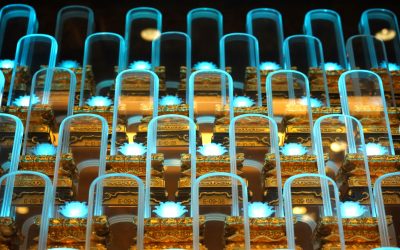Ancestral Tablet
The Chinese have always attached great importance to the tradition of remembering and having gratitude for one’s heritage, and being attentive to the funerary rites of one’s parents. Reverence for ancestors can be said to be an integral belief of Chinese society. For example, the Qing Ming Festival is a traditional festival to commemorate ancestors, mainly to worship ancestors and perform tomb sweeping rites. In agrarian societies, most people would enshrine ancestral tablets in their main halls, and most of the tablets were etched with the words “the Illustrious Father (Name of deceased) Honoured Lord” or “the Illustrious Mother (Name of deceased) Honoured Lady”.

The ancestral tablet is also called “soul tablet”, “spirit tablet”, “soul seat” and others. In Buddhism, it is called “lotus dais” or “lotus seat”. It is generally used as a temporary seat for the soul of the departed to reside, and convenience for the family members, relatives and friends to pay their respects.
Ancestral worship originates from the concept of the “immortal soul”. According to Taoist beliefs concerning the soul, every person has three ethereal souls and seven corporeal souls. Upon death, the seven corporeal souls are dispersed. Among the three ethereal souls, the “sentient soul” will reside at the cemetery or columbarium, the “rational soul” will reside at the ancestral tablet, and the “rational soul” will circulate in the six paths of reincarnation according to cause and effect. It is believed that the “rational soul” is imperishable. After death, it just “migrates” to another existence and the living can communicate with the departed and pray for blessings. The ancestral spirits must have a place of refuge so that the descendants can have an object of worship. Thus, the ancestral tablet becomes a refuge where the ancestral spirits reside. Because they are mostly made of wood, ancestral tablets are also called “Wooden Lords”.

According to legend, ancestral tablets first began in the Eastern Han dynasty. During that time, lived a farmer named Ding Lan, who was raised by his mother because his father died early. He often spoke ill of his mother because of his bad temper. One day, Ding Lan went to work in the fields as usual, and was surprised to find a lamb kneeling down to suckle the milk of its mother. Afterwards, an old shepherd taught him a lesson on filial piety in relation to the proverb, “a lamb kneels to suckle milk from its mother”. Thus, Ding Lan felt ashamed for how he had treated his mother.
On that day, Ding Lan’s mother was in a hurry to go to the field because was delayed in delivering his meal. When Ding Lan saw his mother approaching, he ran to her with a contrite heart. However, his mother mistook his actions for anger. Out of fear, she fled and accidentally fell into a swift-flowing river. Ding Lan couldn’t find any trace of his mother in the river and only recovered a piece of wood. After grieving and mourning, he took the wood home and carved his mother’s name on it; enshrining it in the main hall. From then on, everyone followed his example and worshipped a wooden tablet as an “ancestral tablet”, passing on the traditional virtue of filial piety and gratitude.
At the ancestral hall or the ancestral altar of the family, the ancestral tablets are arranged in accordance to the seniority of the departed. There are incense burners for future generations to offer incense and worship with offerings that include fruits, tea, cakes and others. Each of these tablets must be consecrated with a brush dipped in vermillion. In traditional Chinese funeral rites, it is an essential part of the ceremony.

The wooden plaque used to carve the ancestral tablet is usually already semi-completed – with pre-carved reliefs on it – awaiting further decorative patterns and information such as the appellation and name of the departed to be carved on it. Occasionally there are separate tablets for each male ancestor and spouse, and sometimes there are tablets that include the ancestors of all dynasties.
In line with the changing times and the promotion of the traditional virtue of filial piety, honouring ancestors and serving families, Nirvana Memorial Park (Semenyih and Shah Alam) and Nirvana Center Kuala Lumpur (Nirvana 2) have all introduced ancestral tablets to meet the needs of modern families. The ancestral tablets are enshrined in elegant and majestic air-conditioned halls, and accompanied by the chanting of Buddhist sutras to reflect eternal remembrance.

References
Origins:https://www.wikiwand.com/zh-cn/%E7%A5%96%E5%85%88%E7%89%8C%E4%BD%8D
Ancestral tablets:https://www.fulong.idv.tw/?p=1054
Pet Funeral Guide Malaysia
Funeral Arrangements for Pets in 2021: A Guide There’s nothing quite like the special bond we share with our furry companions. They’ve been with us, provided much joy and comfort for us, accompanied us through dark times and shared many happy moments with us. When the...
Is there need for Nirvana Life Plan Funeral Arrangement
Funeral Arrangements: Is There A Need for A Nirvana Life Plan? You might think, ‘When I go, I just go’, and I can leave all the other matters to my loved ones to take care of. Well, technically, you can, but you can also pre-plan what happens after you depart, right...
Why is Funeral Pre-Planning Important in Malaysia
Funeral Arrangements in Malaysia: Why is Funeral Pre-Planning Important. We often think it’s taboo to discuss death and after-life, and we think that when the time comes, someone will take care of our funeral matters. However, we all have given it some thought, how...
The Ultimate Guide to Funeral Arrangements in Malaysia
Losing a loved one is a distressing experience to deal with. This is because the passing of a dear friend or family member is something you can never truly prepare for no matter how much you try. Moreover, it can get a little confusing as well when you’re forced into...
Nirvana Malaysia: Engaging The Best Funeral Parlour Before Death
While death is still considered to be a taboo subject across many cultures or countries, we can also see a shift in perspective of people who’d choose to plan for their own funeral. This happens due to a variety of reasons, be it budgeting or convenience. This change...
5 main advantages of pre-planning
5 main advantages of pre-planning for yourself You assume financial responsibility of your own funeral When the unthinkable happens, the financial responsibility of your last rites now falls on your family. The average funeral is priced upward of RM20,000 excluding...
Why make offerings of light?
Why make offerings of light? In its most basic context, the act of making an offering in Buddhist tradition enables one to practice generosity in giving, to express gratitude and respect, and to contemplate on the life sustaining law of interdependence. In Buddhist...
The Feng Shui principles behind Sheng Ji
The Feng Shui principles behind Sheng Ji For the benefit of the layperson, the metaphysical art of Feng Shui can basically be divided into two; namely Yin House Feng Shui and Yang House Feng Shui. In a nutshell, Yin House Feng Shui is the practice of geomancy for the...
Ancestral Tablets
The significance of ancestral tablets Ancestor worship is a practice that occupies a supreme role in the religious and social life of Chinese society. Deeply rooted in the all-important virtue of filial piety, much of its associated rites have remained unchanged since...
The difference between columbarium and mausoleum
The difference between columbarium and mausoleum The words columbarium and mausoleum are sometimes used interchangeably but both terms actually refer to very distinct memorial structures. The mausoleum (or mausolea in plural) has always been associated with the...


























